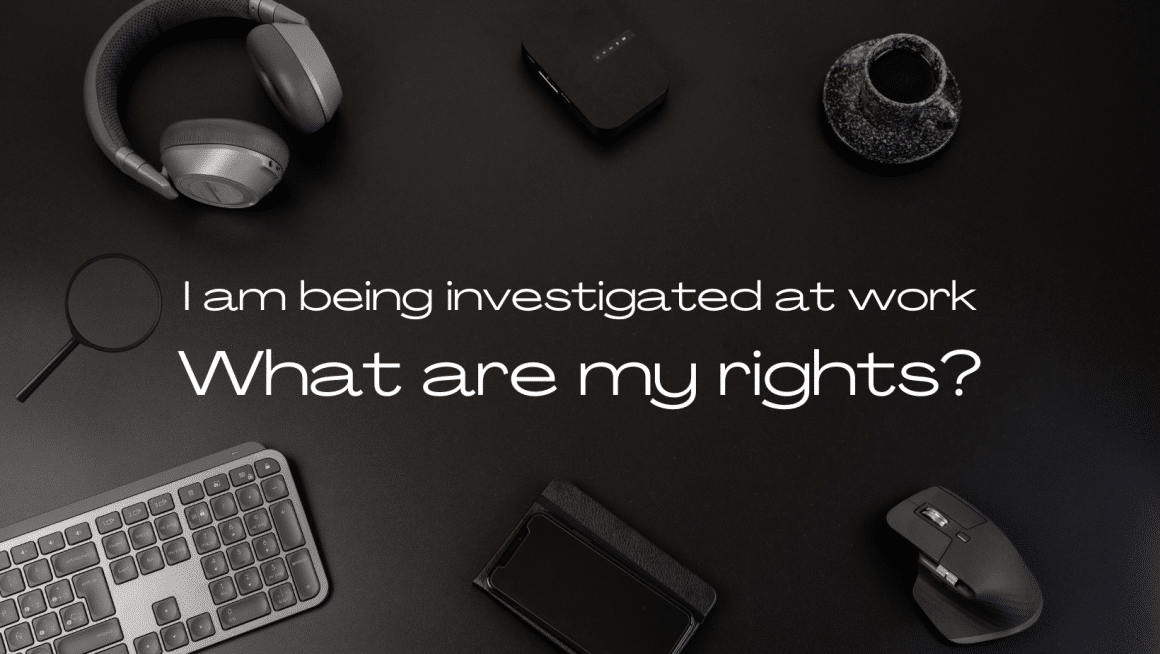I am being investigated at work. What are my rights? Know your rights under investigation at work. Discover protections for employees during inquiries. Empower yourself with invaluable insights and safeguards.
Feeling investigated at work can be challenging. Knowing what you’re entitled to is super important, whether it’s about something you did wrong or how you’ve been performing. I am being investigated at work. What are my rights? might be on your mind, but you’re not alone in thinking about this.
First off, you have the right to know what’s going on. Your boss should tell you about the investigation, what they’re looking into, and how things will go. Remember, they should treat you fairly and respectfully during all of this. You also have the right to bring someone with you. It could be a colleague, a union person, or a legal advisor when you’re talking about the investigation. Having a backup ensures that someone looks after your rights excellently.
Keeping things private during the investigation is also your right. Keep anything you share restricted to those who need to know. It’s to keep things fair and ensure your name isn’t tarnished. Remember, the rights you have might change depending on where you work and the rules they have. Please keep in the loop and talk to HR or a legal pro to understand your rights better and ensure they’re respected during the investigation.
I am being investigated at work. What are my rights? Knowing your rights in this situation is critical. Whether it’s about being in the know, having someone by your side, keeping things private. During a workplace investigation, your go-to guardrails are these rights, shielding you from unfair treatment.
I am being investigated at work, what are my rights?
I am being investigated at work. What are my rights? This question often arises in situations like this. Facing a workplace investigation can be a daunting experience, but understanding your rights during this process is crucial. Here, we’ll explore the fundamental rights you hold as an employee when under investigation at work.
Employee rights under investigation
When undergoing a workplace investigation, it’s crucial to understand the rights that safeguard your interests and guarantee a fair and just process.
The right to privacy
You have a fundamental right to privacy during a workplace investigation. Your employer should conduct the inquiry discreetly, sharing information only with those who have a legitimate need to know. Respecting your confidentiality is crucial throughout this process.
The right to a fair process
A fair investigation process is a cornerstone of your rights. Conduct the inquiry in an unbiased and impartial manner. You must have the opportunity to present your side of the story and provide any evidence that supports your case.
Protection from retaliation
While under investigation, you should not face any form of retaliation for your cooperation or for raising concerns. Your employer should ensure that participating in the investigation does not lead to negative consequences for you.
The right to representation
During the investigation, you have the right to representation. This representation can take various forms, such as a colleague, a union representative, or even an attorney. Having someone by your side can provide invaluable support and guidance.
The right to a timely resolution
Time is of the essence in any investigation. You have the right to a reasonable timeframe for the process. Delays can be stressful, so it’s essential that the investigation moves forward efficiently.
Your role during the investigation
During the investigation, your cooperation is key. It’s important to provide truthful information and be honest, and transparent in your responses. Keeping records of all communication related to the investigation can also be beneficial.
Understanding whistleblower protections
Whistleblower laws may protect you if investigators are looking into your raising concerns about illegal activities or violations of company policies. These laws are in place to safeguard employees who report wrongdoing from retaliation.
Seeking legal counsel
If, at any point, you believe investigators are not respecting your rights during the investigation, consider seeking legal counsel. An attorney can help you understand your rights and options moving forward.
Understanding your rights becomes a powerful tool in the challenging situation of being investigated at work. It empowers you to protect your interests and ensure a fair process. Remember that you have the right to privacy, a fair investigation process, protection from retaliation, the right to representation, and a timely resolution. By understanding and asserting your rights, you can navigate workplace investigations with confidence.
In many jurisdictions, retaliating against you for participating in an investigation or asserting your rights is unlawful. I am being investigated at work. What are my rights? If you believe you are facing retaliation, it’s crucial to report it. Protecting individuals from retaliation is important to maintaining a fair and just investigation process.
Workplace investigation process
I am being investigated at work. What are my rights? Confidentiality is another fundamental right. Understanding your rights is super essential if you’re being checked out at work. Companies use the workplace investigation process to deal with problems like harassment, discrimination, rule-breaking, and other bad stuff.
Knowing your rights when investigated at work
When you’re under investigation at work, you’ve got specific rights to safeguard you. It’s crucial to know these rights to make sure things are fair. You can know what the investigation is about, who’s doing it, and share your side of the story. You can also bring someone to support you during any interviews or meetings related to the investigation.
Facing an investigation might be scary, especially if you’re not sure about your rights. Understanding your rights during a workplace investigation is essential to ensure fairness and proper process execution.
Companies do these investigations to make sure everyone has a safe and fair workplace. They want to solve problems, handle complaints, and stick to the rules and laws.
During an investigation, you retain the right to keep things private. Info about the investigation should only go to those who need it or are part of the process. Also, it’s against the law for anyone to get back at you for taking part in an investigation or making a complaint.
Understanding both the workplace investigation process and your rights is crucial when you’re in this tough spot. Being aware of what’s happening and your rights can provide you with a sense of control and ensure that things are done fairly and by the book.
Dealing with a work investigation can be stressful and make you feel anxious. But you can get legal advice or talk to HR folks. They can guide you about your rights, what the investigation involves, and what you should do in your situation.
The investigation process should be open, I am being investigated at work. What are my rights? and the details should be transparently communicated to you.
Workplace investigation template
Furthermore, you have the right to representation. I am being investigated at work. What are my rights? This means you can have a colleague or a legal representative accompany you during interviews or meetings related to the investigation. A workplace investigation template is like a step-by-step guide for dealing with problems at work. Ensuring that things are looked into properly and fairly involves having a map.
What’s in a workplace investigation template?
Understanding how the investigation process works is crucial when your performance is being evaluated at work. A typical investigation template has:
First report and check
This Part talks about what happened, who’s involved, and the first things done about it.
Plan for investigation
It says what steps to take, like gathering evidence, talking to people involved, and setting deadlines.
Chats and statements
This is where they talk to the folks connected to the issue to get info.
Gathering proof
It’s all about collecting and keeping things like papers, emails, or stuff that matters.
Figuring things out
They check all the info, work out the facts, and make decisions based on what they found.
Writing it down
This is super important – they put together what they discovered and how they got to those conclusions.
Using this template means everyone gets treated fairly and things get solved properly.
When you’re in the hot seat at work, it’s important to know that the investigation should follow a set way to keep things fair. The template helps make sure everyone involved gets treated the same way and everything gets looked into properly.
Following a set template for investigations makes sure things are always done the same way. It means the investigation is fair for everyone involved and follows the right rules.
For someone under investigation at work, knowing what’s in this investigation template is a big deal. It helps you understand what’s coming and gives you a bit of comfort during this uncertain time.
Understanding how to organize the investigation helps you prepare and anticipate what’s coming. It gives you a heads-up and helps make sure the investigation is fair for everyone.
This workplace investigation template is all about making sure workplace issues get handled the same way for everyone. Knowing what’s in it can serve as a guide if someone is looking into you at work.
Furthermore, you have the right to representation. I am being investigated at work. What are my rights? In interviews or meetings connected to the investigation, you have the right to have a colleague or legal representative present.
Investigation procedures and techniques
Navigating a workplace investigation can be a complex and daunting experience, leaving individuals with many questions and concerns. I am being investigated at work. What are my rights? Understanding investigation procedures and techniques is crucial, especially if you’re under the spotlight at work. If someone is looking into you at work, knowing what’s in it can serve as a guide.
Techniques used in workplace investigations
Knowing the methods used can help when you’re being investigated at work. Some common investigation techniques include:
Interviews
Talking to people involved to gather info, understand what happened, and get different sides of the story.
Evidence collection
Gathering documents, emails, or anything that helps understand what went down.
Documentation
Writing down everything to keep track of what’s found and decided during the investigation.
Analyzing data
Checking and thinking about all the info to come to conclusions based on the facts.
Maintaining confidentiality
Keeping things private to only those who need to know about the investigation.
When you’re being checked out at work, knowing about these techniques can give you an idea of what to expect. It can help you feel more in the loop and less stressed during this time.
The methods used in workplace investigations are meant to be fair and consistent. Knowing about these techniques can help you understand the process and your rights better when you’re under investigation at work.
Understanding the techniques used in investigations is important. It helps you prepare and know what’s going on. It also ensures the investigation process is fair and follows the right steps, making sure everyone is treated fairly.
Facing a work investigation can be quite unsettling. I am being investigated at work. What are my rights? This is a common concern many individuals face in such situations. Understanding your rights is essential in maintaining fairness and transparency throughout the process.
Seven investigative techniques
The phrase I am being investigated at work. What are my rights? encapsulates the core of the employee’s concerns and the need for clarity in a time of uncertainty. When there’s a workplace investigation, knowing the methods used can help you get what’s happening. Here are seven common ways they dig into things:
Interviews and interrogations
Talking to people involved to find out what’s going on. Interrogations are more direct, with specific questions to get exact details.
Surveillance and observation
Watching actions or behaviors to collect evidence, like keeping an eye on what’s happening online or in the workplace.
Forensic analysis
Examining documents or emails to find clues or evidence about the investigated case.
Background checks
Checking a person’s history, like past jobs, any criminal records, or other background info that could be important.
Evidence collection
Collecting items like documents or videos that might support or challenge what’s being said during the investigation.
Data analysis
Looking at numbers or digital info to find patterns or things that don’t add up, might help figure out what’s going on.
Polygraph examinations
Sometimes they use lie detector tests to check if what people say is true.
Knowing these techniques can give you an idea of what to expect during a workplace investigation. Being familiar with these methods might help you feel less stressed and more ready for the investigation process at work.
These techniques are all about making sure the investigation is fair and covers everything. Knowing about these methods can help you deal with the investigation and understand your rights better during this time.
Knowing about these techniques can help you better follow what’s happening if you’re being investigated at work. It can also ensure that the investigation is done fairly and accurately.
The first crucial right you have is knowledge about the allegations against you. I am being investigated at work. What are my rights? You have the right to be informed about the specific claims and accusations. Transparency in the investigation process is crucial for clearly understanding the situation.
Investigative techniques definition
When confronted with the unsettling prospect of being investigated at your workplace, the resounding question often arises, I am being investigated at work. What are my rights? Knowing about investigative techniques is super important when you’re being checked out at work. These techniques are all about how people find info and evidence in different places, like at work or in legal stuff.
What do they mean?
Investigative techniques are like plans or ways to find out the truth, collect proof, and check info. They use these techniques at work when checking if someone did something wrong, like breaking company rules. If you’re getting looked into at work, understanding these methods is Key to knowing your rights and how to handle things.
Different techniques
When investigating at work, they use lots of ways. They do interviews, check documents, watch people, and look at digital stuff. Interviews mean talking to people involved to get info and see different sides. Document checks mean looking at records, emails, and written proof. Watching people might mean keeping an eye on what they’re doing. Digital checks are about looking at electronics and info for proof.
Your rights during an investigation
If you’re being checked at work, you’ve got the right to protect yourself during this time. You usually have the right to know about the investigation, to have someone there with you during interviews, and the right to keep things private and fair during the whole process. Knowing and using these rights can really change how the investigation ends and make sure it’s fair.
The investigation process
Workplace investigations usually follow steps. It starts with someone thinking something’s wrong, and then the boss decides to check it out. They gather proof, talk to people involved, check the info, and finally make a decision. Throughout this, it’s important to know your rights and what you should do to make sure everything’s fair and clear.
Laws about investigations
Laws and rules are there for workplace investigations, depending on where you are and what’s going on. Different laws protect your rights when you’re being checked, such as laws about privacy, fairness, and work rights. It’s super important to know these laws to understand what’s okay and what’s not during an investigation.
How to go through an investigation?
When you’re being checked at work, it’s good to know what’s happening, help with the check, and ask HR or legal experts for advice. Remember your rights, be professional, and Don’t get in the way of the investigation. This helps to make sure things end fairly and right.
Knowing about investigative techniques and your rights when you’re being checked at work is super important for a fair and clear process. Understanding these methods, your rights, and how the investigation works can help you get through it well and make sure things end fairly. If you ever find yourself in this situation, remember that knowing what’s going on and helping out can make a big difference in getting a fair outcome.
Additionally, you have the right to representation. I am being investigated at work. What are my rights? This means you can have a colleague or legal representative present during interviews or meetings related to the investigation. Having support during this stressful time can be invaluable.
FAQ: I am being investigated at work. What are my rights?
I am being investigated at work. What are my rights?
When you’re under investigation at work, you’ve got certain rights that protect you. Typically, these rights involve informing you about the investigation, ensuring someone accompanies you during interviews, and maintaining fairness and confidentiality. Knowing and using these rights can really make a difference in how the investigation turns out.
Are there different types of investigative techniques used in workplace investigations?
Sure, there are various techniques used in workplace investigations. They do interviews to talk to people involved, check documents for evidence, watch activities, and examine digital stuff. Interviews gather info, document checks look for proof in records and emails, surveillance keeps an eye on things, and digital forensics checks electronic devices and data for evidence.
How should I navigate an investigation at work?
Remaining informed during a work investigation is crucial. You should actively contribute to the investigation, seek guidance from HR or legal experts, and stay engaged in the process. Knowing your rights, acting professionally, and not interrupting the investigation are key to getting a fair and just result.
What is the typical process of workplace investigations?
Workplace investigations usually follow steps. It begins with a complaint or suspicion, then the boss decides to look into it. They gather proof, talk to people involved, check info, and finally decide what to do. All the way through, knowing your rights and what you should do is essential for fairness and honesty.
Are there laws protecting employees during workplace investigations?
Absolutely, there are laws to protect employees during investigations. They cover things like privacy, fairness, and work rights. Knowing these laws helps you understand what’s okay and what’s not during an investigation.
Final thoughts
Going through a work investigation can be scary, but you have the right to back you up. Knowing these rights is essential to keep your position and ensure you’re treated fairly during this challenging time. If you’re thinking, I’m being checked out at work. What rights do I have? First, you’ve got the right to know exactly what you’re being accused of. The investigation process should be open and clearly explained to you.
Your second right is about privacy. Usually, investigations should be kept hush-hush to protect everyone involved and support the process somewhat. Plus, you’ve got the right to bring someone with you. It could be a co-worker or a legal pro when you’re being questioned or in meetings related to the investigation. Remember, being truthful and cooperative during the investigation is crucial while still sticking up for your rights. You have the right to ask questions about the process and what might happen because of it.
Also, remember that it’s not okay for anyone to get back at you for participating in an investigation or standing up for your rights. In many places, that’s against the law. If you think you’re facing retaliation, you need to report it. Get legal advice if you feel your rights are being ignored or the investigation isn’t fair. Laws about work and privileges can be tricky and change from place to place.
In short, being under investigation at work can be challenging, but knowing your rights is critical. Stay in the loop, get support, and if you need to, talk to a legal expert to make sure your rights are respected all the way through. Remember, you deserve a fair investigation. Facing a work investigation is undoubtedly a daunting experience. I am being investigated at work. What are my rights?






